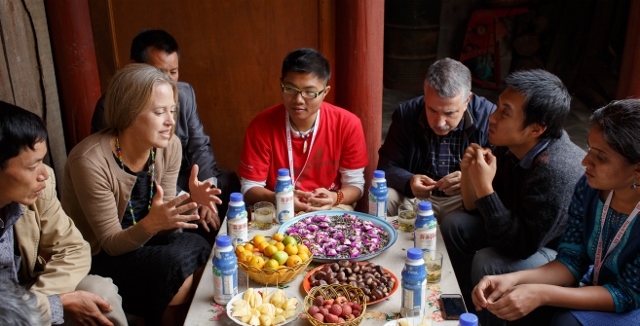Why is Education a Global Issue?
Q&A with Teach For All's Wendy Kopp

On May 12, Asia Society Northern California will honor Co-Founder and CEO of Teach For All Wendy Kopp for her role in transforming education at its 11th Annual Dinner, Education in a Global Era: The U.S.-Asia Connection. Kopp will also speak at Asia Society's program the same day, Global Education for a Global World, which will explore global competence and how to achieve it for all students.
Teach For All is a global network of independent social enterprises working to expand educational opportunity in their countries by enlisting talented future leaders to the effort. It is currently active in over 30 countries.
To learn more, hear Kopp and global education experts deliberate on the skills students need in today’s global environment and how best to provide them on May 12 in San Francisco.
After 20 years at Teach For America, why was it important to “go global?”
Teach For All grew as a response to social entrepreneurs from many countries who were looking for help in adapting Teach For America’s model to their own contexts. As we progressed, we saw that educational inequity is a pervasive global problem that is very similar in its nature from place to place, which led us to realize that we could make a big impact through supporting the development of this model around the world and fostering learning and sharing among the staff, teachers, and alumni in different countries.
What innovations have you found in Asian countries?
The example of Shanghai, China, is so striking. Twenty years ago they had low educational outcomes and significant disparities, but today they have the highest levels of educational excellence and equity in the world. They’ve done this through investing in teacher development, setting rigorous standards that require students to think critically, and integrating disadvantaged students while providing them with extra support, among other things.
This past fall, I met Minxuan Zhang, President of Shanghai Normal University, who has been at the center of this transformation. He told me that the number one reason for their success is their “open door policy”—they send educators around the world to learn from other systems. Imagine if we all had this kind of global approach—we could be learning so much from one another.
What skills must today’s students develop in order to be successful in an interconnected world?
Cultivating leadership skills in our students is essential—perseverance, self-efficacy, critical consciousness about our world, critical thinking, and communication skills. Some of the world’s greatest potential leaders are today’s most marginalized students because they’ve overcome adversity and have experienced the inequities we must address if we’re going to build a stronger and more just society. But unlocking their potential is going to take channeling immense resources and energy into schools in low-income communities.
You said in a recent interview that it’s very difficult convincing people to invest in improving education globally. How have you approached this?
Globally, 250 million children aren't on track to learning even the most basic literacy and numeracy skills. We cannot afford to ignore this given that our fates are interconnected – our economic prosperity, environmental sustainability, public safety, and health. One economy fails and we all feel the effects. When educational disparities widen in one corner of the world, hopelessness festers and the whole world grows less safe. We’re working to help people understand this, and also to understand how much we can improve local outcomes—and in turn our collective welfare—through taking a global approach to fostering learning and sharing across contexts.
More Information & Further Reading
Details and tickets for ASNC's May 12 program Global Education for a Global World
Details and tickets for ASNC's 11th Anniversary Annual Dinner Education in a Global Era: The U.S. - Asia Connection
Kopp featured at Asia Society's December 2013 program Making the Grade in Global Education
Learn more about Asia Society's Education initiatives.
Interview edited for publication. Asia Society’s Global Learning and Leadership’s mission is to develop students' and young leaders' global competence as the foundation for understanding between people in the Asia Pacific region and throughout the world.